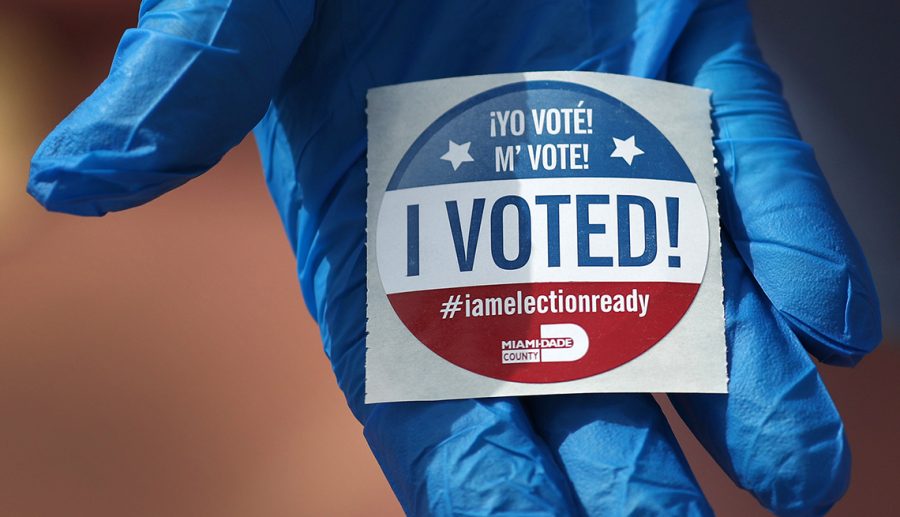How Can We Get Our Youth To Vote?
Photo by Joe Raedle/Getty Images
Sep 19, 2020
It was quite a shock to learn in my AP Government class sophomore year that young people are not the largest demographic to vote. From primary all the way to Presidential elections, the voter turnout of people between the ages of 18-29 has been at one of the lowest rates in the US compared to other democracies across the world, such as Germany and Canada. According to the United States Election Project, 71% of eligible voters over 60 participated in the 2016 presidential election, compared to 18-29-year-olds at just 43%.
Yet it is no secret; however, that young people throughout the past decade have been one of the most vocal groups and have served as a catalyst for conversations and debates on issues spanning from mass school shootings, climate change, the mistreatment of minority groups, and racial injustice. In September of 2019, thousands of millennials and those a part of Generation Z advocated for a push against the inaction of government leaders on climate change during the Global Climate Strike. In June of 2020, thousands also flooded the streets in the wake of the death of George Floyd and denouncing racism.
But protests have occurred in years past countless times, and yet there has not been a staggering direct correlation between increased protest and voter turnout. According to a statement made by former President Barack Obama during a digital town hall in June, the issue of protests and elections cannot be separated. “I’ve been hearing a little bit of chatter on the Internet about voting versus protest,” he said. “Politics and participation versus civil disobedience and direct action. This is not an either/or. This is a both/and.”
So, the ultimate question becomes, if young people want change, why do they not vote?
The answer has been narrowed down to two things: improper civics education and confusion with the voting process itself. Not all high schools across the United States receive the same level of civic education, and surveys have shown that simply an increase in basic civic education in states that do not have so would not increase turnout either.
The key is engagement and discussion, and numerous organizations have taken a step forward to organize our youth, such as Civic Nation’s All in Challenge. The organization has worked to promote political conversations among young voters through presentations across college campuses. Schools that have aided eligible students to vote and also hold discussions of contemporary issues in politics have led to an increase in civic engagement across the nation as well.
For Harsi Gandhi, Board of Education Senior Rep and Senior Cabinet Secretary, Niles West has done its part in ensuring that political engagement is instilled into our day to day lives as students. “I definitely feel that Niles West has attempted to do more to incite political conversations among youth. With the formation of clubs such as PACE, there is an exponentially growing interest that our young adults have displayed towards politics.” Gandhi said. “Through several other clubs and activities (Student Gov, Model UN, etc.), students are given the change to experience what holding leadership is and the finer details and behind the scene action that is unknown to many. As a senior, I have seen Niles West’s continuous efforts to ensure the student body is aware of their rights, whether it be nationally or school-wide.”
Political conversations compose half of the solution. The second part of the answer has to do with the confusion amongst young voters on the logistics of getting your vote in the ballot box. A study conducted in 2015 by the Midwest Political Association found that preregistration increases voter turnout. Only about 18 states, along with the District of Columbia, however, allow preregistration. The good news is, Illinois is one of those states. According to USA.gov, in Illinois, one must be at least 17 years old on or before the primary election date and turn 18 on or before the date of the general or consolidated election.
For members of Niles West’s Politics and Current Events (PACE) club, the upcoming election cycle is of utmost importance. Ethan Suh, President of Student Government and secretary of the club, sees that the need to vote could not have come at a better time. “I will be voting in the election cycle. At this current time, there is no better thing a citizen can do to help move America in a positive direction.” Director of Social Media for the club, Tam Luu, plans to vote in the upcoming election as well and is hoping to see a lot of participation from all students amidst the current political climate.
“With COVID-19 being in play, people will not want or be able to show up to a polling center and cast their ballot. The majority of states require no excuse to get the mail-in ballot while some do,” Luu said. “There has also been a lot of talk about voter suppression with the shut down of the USPS and some polling places.”
For Luu, the possibility of not have votes counted is not the only factor youth should consider. “It is so fundamental that people who are eligible register to vote because there are changes that we would all love to see, regardless of beliefs,” she said. “If people aren’t eligible, staying informed, help with canvassing, be an activist, etc., are such a good way of knowing what you want for your country and what you can do for it as well.”
For information about how you can register to vote before the Illinois General Election, visit https://www.rockthevote.org/how-to-vote/illinois.
For information on how to apply and be selected as a High School Student Election Judge, visit https://www.cookcountyclerk.com/service/high-school-student-election-judges.




